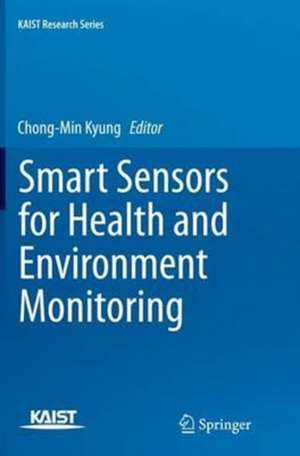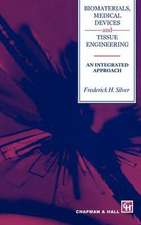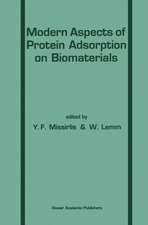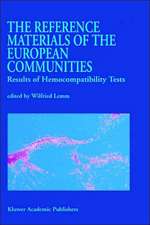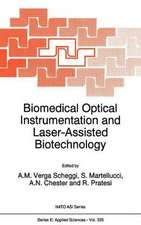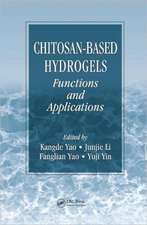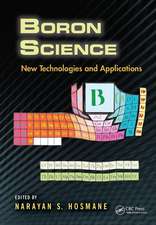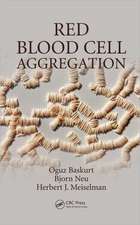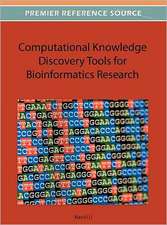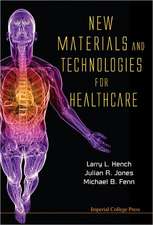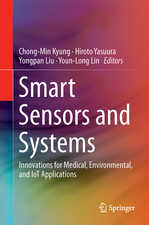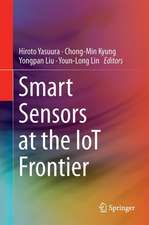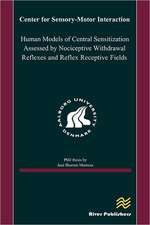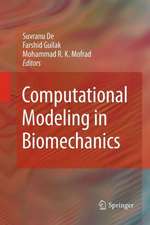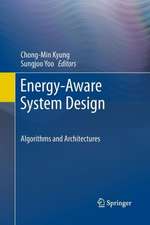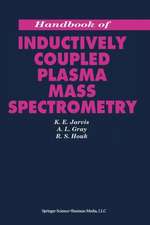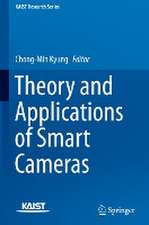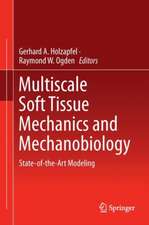Smart Sensors for Health and Environment Monitoring: KAIST Research Series
Editat de Chong-Min Kyungen Limba Engleză Paperback – 23 oct 2016
This is the second of three books based on the Integrated Smart Sensors research project, which describe the development of innovative devices, circuits, and system-level enabling technologies. The aim of the project was to develop common platforms on which various devices and sensors can be loaded, and to create systems offering significant improvements in information processing speed, energy usage, and size.
This book contains substantial reference lists and over 150 figures, introducing the reader to the subject in a tutorial style whilst also addressing state-of-the-art research results, allowing it to be used as a guide for starting researchers.
| Toate formatele și edițiile | Preț | Express |
|---|---|---|
| Paperback (1) | 668.75 lei 38-44 zile | |
| SPRINGER NETHERLANDS – 23 oct 2016 | 668.75 lei 38-44 zile | |
| Hardback (1) | 730.19 lei 22-36 zile | |
| SPRINGER NETHERLANDS – 4 aug 2015 | 730.19 lei 22-36 zile |
Preț: 668.75 lei
Preț vechi: 703.94 lei
-5% Nou
Puncte Express: 1003
Preț estimativ în valută:
127.96€ • 133.96$ • 105.88£
127.96€ • 133.96$ • 105.88£
Carte tipărită la comandă
Livrare economică 02-08 aprilie
Preluare comenzi: 021 569.72.76
Specificații
ISBN-13: 9789402403282
ISBN-10: 9402403280
Pagini: 323
Ilustrații: VI, 323 p. 166 illus., 121 illus. in color.
Dimensiuni: 155 x 235 mm
Ediția:Softcover reprint of the original 1st ed. 2015
Editura: SPRINGER NETHERLANDS
Colecția Springer
Seria KAIST Research Series
Locul publicării:Dordrecht, Netherlands
ISBN-10: 9402403280
Pagini: 323
Ilustrații: VI, 323 p. 166 illus., 121 illus. in color.
Dimensiuni: 155 x 235 mm
Ediția:Softcover reprint of the original 1st ed. 2015
Editura: SPRINGER NETHERLANDS
Colecția Springer
Seria KAIST Research Series
Locul publicării:Dordrecht, Netherlands
Cuprins
PART 1 Bio-Medical Sensors.- 1 A CNT network platform integrated on CMOS circuit; Jaeheung Lim, Jun Yeon Yun, Jinhong Ahn, Young June Park.- 2 Exhaled Breath Sensors; Il-Doo Kim, Seon-Jin Choi, Sang-Joon Kim, Ji-Su Jang.- 3 Implantable Neural Sensors for Brain Machine Interface; Jungwoo Jang, Jihun Lee, Mingyu Kang, Yoon-Kyu Song.- 4 Implantable brain interface: high-density microelectrode array for neural recording; Sang Beom Jun.- 5 Optical Coherence Tomography for Clinical Applications; Wang-Yuhl Oh.- PART 2 Sensors for Environmental Monitoring.- 6 Microfabricated and nanoengineered chemical sensors for air quality monitoring system; Inkyu Park, Daejong Yang, Kyungnam Kang.- 7 Miniaturized VOC detectors for monitoring indoor air quality; Kyounghoon Lee, Dae-Hyun Baek, Han-Il Jung, Jongbaeg Kim.- 8 Heaterless Operation of Chemoresistive gas sensors for furture functional convergence; Ho Won Jang, Young Seok Shim, Yeon Hoo Kim.- 9 Sensors and Devices for Heavy Metal Ion Detection; Si-Hyung Lim.- 10 Fatigue Crack Detection Methodology; Hoon Sohn, Hyung Jin Lim, Suyoung Yang.- PART 3 Wireless Connectivity Solutions for Sensors.- 11 Data Networking for Automomous Fatigue Cract Detection; Jinhwan Jung, Deawoo Kim, Hankyeol Lee, Yung Yi.- 12 Energy-efficient sensing data delivery for low power environmental sensors; Deawoo Kim, Jinhwan Jung, Hankyeol Lee, Yung Yi.- 13 Codign for wireless sensor networks; Sae-Young Chung, Si-Hyeon Lee.
Notă biografică
Chong-Min Kyung (Professor, KAIST) received B.S. in Electrical Engineering (EE) from Seoul National University in 1975, M.S. and Ph.D. in EE from KAIST in 1977 and 1981, respectively. He worked at Bell Telephone Laboratories, Murray Hill during 1981-1983. Since 1983, he has been Professor at the Department of EE at KAIST. He started Center for Integrated Smart Sensors (CISS) in 2011, sponsored as Global Frontier Project by Korean government. He has published over 300 international journal/conference papers on device physics/simulation, CAD, computer graphics, and System-on-a-Chip design including RISC/CISC microprocessors, VLIW and reconfigurable DSP cores, and video CODEC.
His current research focuses on applying system-level cost-energy-rate-distortion optimization techniques to the design of smart sensors, especially smart cameras.
He has led, as Founding Director, IDEC (IC Design Education Center) during 1995-2011. He received Best Paper Awards in numerous international conferences including ASP-DAC 1997 and 1998, DAC in 2000, ICSPAT in 1999, ICCD in 1999, ISOCC in 2009, and ISQED in 2014. He is a member of National Academy of Engineering Korea and Korean Academy of Science and Technology and IEEE Fellow.
His current research focuses on applying system-level cost-energy-rate-distortion optimization techniques to the design of smart sensors, especially smart cameras.
He has led, as Founding Director, IDEC (IC Design Education Center) during 1995-2011. He received Best Paper Awards in numerous international conferences including ASP-DAC 1997 and 1998, DAC in 2000, ICSPAT in 1999, ICCD in 1999, ISOCC in 2009, and ISQED in 2014. He is a member of National Academy of Engineering Korea and Korean Academy of Science and Technology and IEEE Fellow.
Textul de pe ultima copertă
This book covers two most important applications of smart sensors, namely bio-health sensing and environmental monitoring. The approach taken is holistic and covers the complete scope of the subject matter from the principles of the sensing mechanism, through device physics, circuit and system implementation techniques, and energy issues to wireless connectivity solutions. It is written at a level suitable mainly for post-graduate level researchers interested in practical applications. The chapters are independent but complementary to each other, and the book works within the wider perspective of essential smart sensors for the Internet of Things (IoT).
This is the second of three books based on the Integrated Smart Sensors research project, which describe the development of innovative devices, circuits, and system-level enabling technologies. The aim of the project was to develop common platforms on which various devices and sensors can be loaded, and to create systems offering significant improvements in information processing speed, energy usage, and size.
This book contains substantial reference lists and over 150 figures, introducing the reader to the subject in a tutorial style whilst also addressing state-of-the-art research results, allowing it to be used as a guide for starting researchers.
This is the second of three books based on the Integrated Smart Sensors research project, which describe the development of innovative devices, circuits, and system-level enabling technologies. The aim of the project was to develop common platforms on which various devices and sensors can be loaded, and to create systems offering significant improvements in information processing speed, energy usage, and size.
This book contains substantial reference lists and over 150 figures, introducing the reader to the subject in a tutorial style whilst also addressing state-of-the-art research results, allowing it to be used as a guide for starting researchers.
Caracteristici
Describes innovations in the application of smart sensors in health care and environmental monitoring Outlines details of state-of-the-art research results targeted towards practical applications Presents the unique results from a Ministry of Science, ICT & Future Planning of Korea funded project Includes supplementary material: sn.pub/extras
